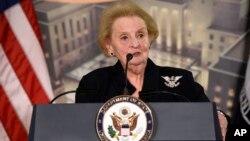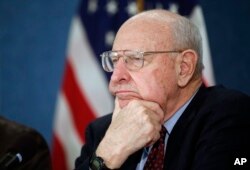Nine former U.S. ambassadors to the United Nations have signed a letter to members of Congress urging them not to slash U.S. contributions to the U.N. budget.
“The U.N. remains an indispensable instrument for advancing the global stability and prosperity on which U.S. interests and priorities depend,” the ambassadors wrote. “We therefore urge you to support U.S. leadership at the U.N., including through continued payment of our assessed and voluntary financial contributions to the organization.”
The ambassadors are from both Republican and Democratic administrations, spanning five presidents.
U.S. is U.N.'s largest donor
The United States is the U.N.'s largest donor, contributing about $611 million this year to the regular budget of more than $2.5 billion. Washington also contributes more than $2 billion annually to support U.N. peacekeeping missions and hundreds of millions more to vital programs including the U.N. Children's Fund and the World Food Program.
The Trump administration announced earlier this month that it would no longer fund the U.N. Population Fund, which provides lifesaving care to millions of women and girls around the world.
“None of us believe the U.N. is perfect, but we all believe it remains an essential tool in America's foreign policy and national security tool box,” said Madeleine Albright, who served as President Bill Clinton's U.N. ambassador and later as the first female secretary of state.
“Whether we are dealing with North Korea, Iran, Iraq or Mali, the U.N. plays a vital and unique role in galvanizing the global community and increasing pressure on rogue actors and meeting humanitarian needs on the ground,” she told reporters during a conference call about the letter.
Leadership role at risk
She warned that if the U.S. retreats on its financial contributions, other powers such as Russia and China will move to fill the gap, potentially taking the U.S. leadership role with them.
“It is important strategically for us to know that the U.N. plays a huge role in dealing with problems in a way that keeps us from having to deal with them,” former U.N. Ambassador Thomas Pickering told reporters. Pickering served as U.N. envoy under Republican President George H.W. Bush.
He pointed to peacekeeping operations, saying that while the U.S. shoulders more than a quarter of the annual budget, the country is in return spared putting its own troops on the ground in places where it is in the U.S. interest to see stability.
Trump seeks 28 percent cut in funding
Last month, President Donald Trump announced he is seeking a 28 percent budget cut for diplomacy and foreign aid, which includes an unspecified reduction in U.N. funding.
Trump had lunch at the White House on Monday with U.N. Security Council ambassadors. He said “big reforms” are needed at the world body, complaining that costs have “absolutely gone out of control.” But he hinted that if the U.N. performs better, he would not be as tough on the U.S. contribution.









